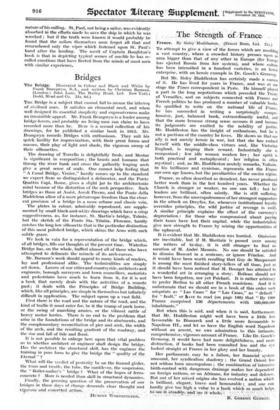• -The , Strength of, France France. By Sisley Huddleston. (Eineit
Beim, Ltd. 21s.) To attempt to give a view of the forces which are moulding a vast country, where a crowded history presses upon an area bigger than that of any other in Europe (for Europe has ejected Russia from her system), and where culture has been intensified in a hundred varieties, is an heroic enterprise, with an heroic example in Dr. Gooch's Germany.
But Mr. Sisley Huddleston has certainly made a success of it. He has lived for years in France, and was at one stage the Times correspondent in Paris. He himself played a part in the long negotiations which preceded the Treaty of Versailles, and on subjects connected with France and French politics he has produced a number of valuable books. So qualified to write on the national life of France, he has succeeded in writing a surprisingly compre- hensive, just, balaficed book, extraordinarily useful, and that the more because strong sense savours it and because its judgments are exalted to the nobility of justice. Mr. Huddleston has the insight of enthusiasm, but he is not a partisan of the country he loves. He shows us that our ally is not merely heroic in war, but that she has endued herself with the middle-class virtues and, like Victorian England, is reaping their reward. Industrially she is reorganized ; few idle women weaken her ; her spirit is both practical and metaphysical ; her • religion is often mystical ; and, as Mr. Huddleston acutely remarks, Voltaire, in his brilliance and cynicism, represents not the France our own age knows, but the peculiarities of the aneien regime.
France, so often described as decadent, has never produced better work than in the last hundred years. Whether the Church is stronger or weaker, no one can tell ; but her leaders are brilliant, often saintly. She is still suffering, however, from the unscrupulousness of her strongest supporters in the attack on Dreyfus, for, whenever institutional loyalty overrides principles, the wild justice of revenge is swift. A similar principle explains the effect of the currency's depreciation : for those who compromised about paying their taxes have lost their capital, while the industrialists give new strength to France by seizing the opportunities of the upheaval.
It is evident that Mr. Huddleston was hurried. Omissions are inevitable, but if M. Maritain is passed over among the writers of to-day, it is still stranger to find no mention of M. Andre Maurois. No one should be satisfied to dismiss Bossuet in a sentence, or ignore Fenelon. And it would have been worth recalling that Guy de Maupassant is among the most finished story-tellers of all time, just as it should have been noticed that M. Bourget has attained to a wonderful art in arranging a story. Boileau should not have been forgotten, nor yet Psichari. It is rather arbitrary to prefer Berlioz to all other French musicians. And it is unfortunate that we should see in a book of this order such misprints as " Las Cases " for " Las Casas," as " default" for " fault," or have to read (on page 180) that " By 1909 France comprised 180 departements with 100,000,000 inhabitants."
But when this is said, and when it is said, furthermore, that Mr. Huddleston might well have been a little less favourable to Bismarck and a little more faVourable to Napoleon III., and let us have the English word Napoleon without an accent, we owe admiration to this intimate, comprehensive, vigorous account of France. Like Dr. Gooch's Germany, it would have had more delightfulness, and more distinction, if books had been consulted less and the eye looked straight at France in her glory and her beauty.
Her parliaments may be a failure, her financial system unsound, her syndicalism shadowy ; the Grand Orient has not seldom been unscrupulous ; the combination of intensive birth-control with dangerous drainage makes her dependent on foreign nations, or on Africans, for industry and defence. But out of her mixed origins she has evolved a nation which is brilliant, elegant, brave and honourable ; and one can hardly give too high a value to a book which so much helps to see -it -iiteachlzr and 'See it whole. - s' •
R. GORDON GEORGE.






























































 Previous page
Previous page